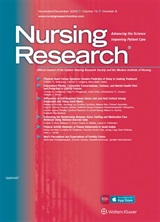
Editor's Note Only 39% of nurses expect to remain in their current jobs a year from now, citing burnout, compassion fatigue, and inflexible schedules as top reasons for leaving, according to AMN Healthcare’s 2025 Survey of Registered Nurses. Healthcare IT News reported on the findings May 14. As detailed in…

Editor's Note Nurses continue to face high stress, burnout, and understaffing, according to the State of Nursing in 2025 report by Cross Country Healthcare and FAU’s Christine E. Lynn College of Nursing. As detailed in an April 29 summary from Florida Atlantic University, the report is based on responses from…

Editor's Note Healthcare’s workforce crisis stems from systemic trauma—not individual burnout. That’s the central argument of a commentary published April 30 in MedPage Today, in which Taylor Nichols, MD, a board-certified physician in emergency medicine and addiction medicine, calls for a sweeping shift in how healthcare-associated stress is understood and…

Editor's Note A recent article in HealthLeaders profiles an innovative approach to alleviating nurse burnout—one that the outlet calls “a four-legged answer to nurse wellbeing.” Launched in 2020 at The Ohio State University Wexner Medical Center, the Buckeye Paws program brings certified therapy dogs directly to nursing units, offering nonjudgmental,…

Editor's Note Nearly 140,000 nurses have left the workforce since 2022, and 40% of the remaining workforce plans to exit by 2029, according to the 2024 National Nursing Workforce Study from the National Council of State Boards of Nursing (NCSBN). According to an April 17 announcement from NCSBN, the survey…

The idea that “you can take the nurse out of the OR, but you can’t take the OR out of the nurse” is not new. And yet, a recent panel discussion among emerging nurse leaders indicates this old adage rings truer today than ever. Speaking at the 2024 OR Manager…

Editor's Note Optimizing surgeon stress could enhance surgical performance and patient outcomes, according to a large cohort study published January 15 in JAMA Surgery. Researchers focused particularly on physiological markers of surgeon stress during the first 5 minutes of a procedure, revealing a significant inverse relationship with major patient complications.…

Editor's Note A scoping review of 15 studies reveals that the COVID-19 pandemic significantly disrupted oncological abdominal surgery (OAS), leading to postponed or canceled procedures, adoption of alternative treatment plans, and increased psychological stress among surgical teams. Published November 5 in the American Journal of Surgery, the findings emphasize the…

Editor's Note A study analyzing data from the National Database of Nursing Quality Indicators (NDNQI) revealed that nursing-sensitive quality indicators (NSIs) worsened during the COVID-19 pandemic and remain elevated years after the onset of the pandemic, reflecting ongoing challenges in nursing practice. Published in the journal Nursing Research, the findings…

Editor's Note Poor sleep quality in the month leading up to surgery could increase the risk of postoperative delirium, according to research presented at the Anesthesiology 2024 annual meeting, hosted by the American Society of Anesthesiologists (ASA). An October 15 report in NewsWise has the details. According to the article,…